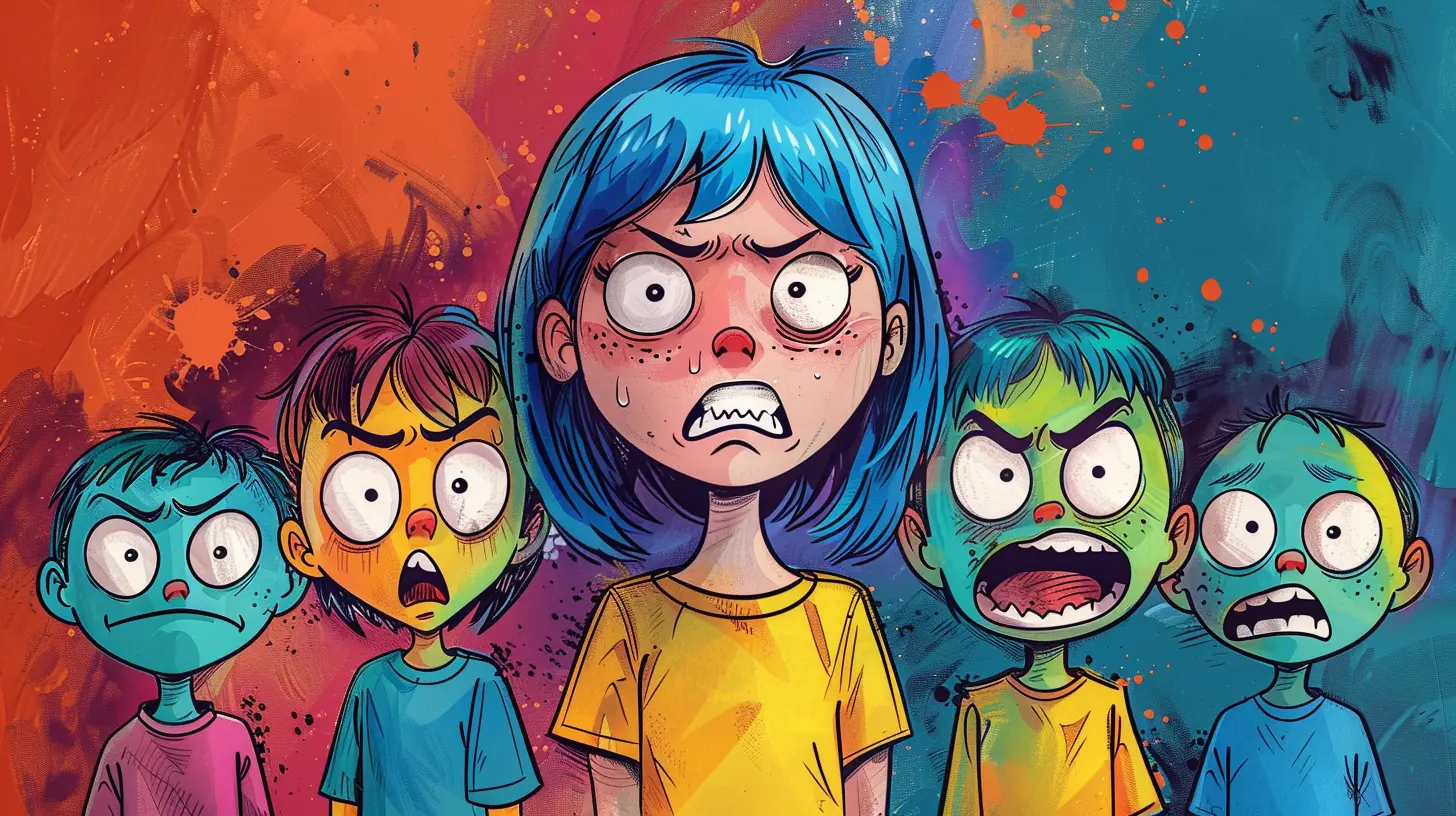How to Handle Your Child's Big Emotions When You Feel Drained
5 August 2025
Let’s be real—parenting is beautiful, messy, exhausting, and at times… downright overwhelming. We all have those moments where our kids are melting down about something small (but big to them)—and all we want is five minutes of peace and maybe a coffee that's not cold.
But what happens when your child’s big emotions show up just when your tank is empty? You’ve had a long day, everything is messed up, and you’re running on fumes. How do you manage their emotional storms when you're just trying to weather your own?
You're not alone. And you’re certainly not a bad parent for feeling this way.
In this post, we're diving deep into how to handle your child’s big emotions, especially during those times when you're completely drained. It’s about survival, connection, and grace—not perfection.
Understanding What “Big Emotions” Really Mean in Kids
Kids feel things with their whole being. They don’t have a filter like adults. When they’re happy, they’re ecstatic. When they’re mad, it's total chaos. And when they’re sad, it’s like their little world just ended.Big emotions in children are completely normal. They’re still learning how to process feelings like frustration, disappointment, jealousy, and even excitement.
But let’s face it—when they throw themselves on the floor in the grocery store or scream because their banana broke the wrong way, it can push you straight to the edge.
So why does this happen?
They're Not Mini Adults
First off, children’s brains are still under construction. The part responsible for emotional regulation—the prefrontal cortex—isn’t fully developed until their mid-20s! That means your calm, logical child is a work in progress.Their emotions are raw, immediate, and often explosive. It’s not that they’re trying to be difficult—it’s that they haven’t learned how to ride the emotional waves yet.
Their Behavior Isn’t Personal
It’s hard, I know, but their meltdown isn’t an attack on you. When your child is in full-throttle emotional mode, they aren’t thinking, “Let me see how much I can drive Mom/Dad crazy today.” They’re overwhelmed and asking for help the only way they know how—even if that “help” comes in the form of a shriek.
When You’re Running on Empty: Why It Feels Harder
Let’s talk about you. Because your emotional state matters just as much as your child’s.We aren’t robots. Parenting requires emotional labor 24/7. And when you have nothing left to give, even the smallest demands can feel like an avalanche.
Emotional Contagion Is Real
Emotions are contagious. If you're visibly frustrated, your child probably will be too. But here’s the kicker—if they’re already dysregulated, and you’re barely holding it together, things can spiral fast.So when you’re empty, it’s harder to stay calm. You snap quicker, feel guiltier, and the emotional toll digs deeper.
You Can’t Pour From an Empty Cup
Yeah, it’s a cliché—but it’s true. Emotional exhaustion means you’re more reactive and less patient. You may say things you don’t mean, or disappear into guilt-land afterward. It doesn’t make you a bad parent—it makes you human. But it also signals that you need care too.
9 Heartfelt Ways to Handle Your Child’s Big Emotions When You’re Drained
1. Give Yourself Permission to Not Be Perfect
The first thing? Let go of perfection. You’re not supposed to have all the answers or always know what to do. Your kid doesn’t need perfection—they need presence. Even if that presence is tired, messy, and wearing yesterday’s shirt.It’s okay to say, “I’m feeling really tired right now, but I’m here for you.”
That honesty teaches resilience, empathy, and the beauty of imperfection.
2. Create a Calm Reset Ritual (For Both of You)
When emotions are high, clarity is low. That's when both you and your child need a reset button.Maybe it’s a quiet cuddle on the couch. Maybe it's blasting a silly song and dancing it out. Or taking a walk around the block in silence. Find something that helps both of you pause the chaos—even for a moment.
It’s not about pretending everything’s fine—it’s about reconnecting with calm.
3. Use Fewer Words, More Connection
In the middle of a meltdown, long lectures don’t work. Kids can’t process logic when they’re in emotional overdrive.So instead of explaining or fixing, simplify. Use a calm tone. Hold them (if they’ll let you). Say things like:
- “You’re safe.”
- “I see you.”
- “I’m here.”
Let your child feel felt. That’s more powerful than any speech.
4. Take a Break (Yes, You Can)
Time-outs aren’t just for kids. If you feel yourself about to boil over, it’s okay to step away—for a minute, for five, however long you need to cool the flames.Say: “I need a moment to calm down so I can help you better.” That’s not abandonment—it’s modeling healthy boundaries and self-regulation.
You’ll return clearer. And your child learns that emotional overwhelm isn’t shameful—it’s survivable.
5. Lower the Bar (Temporarily)
When you're drained, now may not be the time to enforce that 10-step bedtime routine or expect model behavior.Pick your battles. Prioritize emotional safety over discipline. Maybe your child eats cereal for dinner and skips bath time. That’s okay. Survival mode is real, and you’re allowed to adjust your expectations.
6. Try the “Name It to Tame It” Method
This works like magic. When your child is melting down, help them label what they’re feeling.Say things like:
- “It looks like you’re really frustrated.”
- “You’re feeling so mad your body doesn't know what to do.”
This simple act of naming an emotion helps your child begin the journey of emotional literacy—and it helps you stay in empathy mode (instead of reaction mode).
7. Repair After You React
Let’s be honest—you won’t always handle things well. You might yell, cry, or shut down.But here’s the gold: repair builds connection. Go back later and say:
- “I’m sorry I yelled. I was feeling overwhelmed. Everyone gets big feelings sometimes—even grown-ups.”
This teaches your child that mistakes are part of relationships—and that repairing them with love matters more than being right.
8. Build an Emotional Toolbox Ahead of Time
You can’t always plan for meltdowns—but you can get equipped.Create an emotional toolbox for your child (and you!) that includes:
- Deep-breathing cards
- Fidget toys
- Favorite feel-good songs
- A comfort stuffed animal
- A safe space to cool down
The more tools you both have, the less helpless you’ll feel when emotions run wild.
9. Fill Your Own Cup (Even Bit by Bit)
You can’t support big emotions if your emotional energy is always on “low battery.”Start small. You might not get a full spa day, but maybe it’s sipping tea in silence for five minutes, calling a friend, or just putting on mascara because that makes you feel human again.
Tiny acts of self-care aren’t selfish—they’re survival. You matter, too.
When to Get Extra Help
If your child’s big emotions are constant, aggressive, or impacting daily life—or if your emotional burnout feels never-ending—you’re not failing. But it may be time to reach out.Talk to a pediatrician, therapist, or parent coach. There’s no shame in needing support. There’s strength in asking for it.
Final Thoughts: You’ve Got This, Even When It Feels Like You Don’t
Parenting isn’t about being endlessly patient or always “on.” It’s about showing up, again and again—even when you’re exhausted, even when you don’t have the perfect response.Your child’s big emotions don’t need a flawless parent. They need a real one.
One who sits with them through the storm.
One who tries, messes up, and keeps trying.
One who says, “I love you, no matter what.”
So the next time your child breaks down and your brain screams “I can’t deal with this,” just remember: You're doing more than enough. You’re showing up with love—even when you’re running on empty. That’s the heart of parenting.
You’ve got this.
all images in this post were generated using AI tools
Category:
Parenting StrugglesAuthor:

Steven McLain
Discussion
rate this article
1 comments
Anisa Wilcox
Channel your inner octopus: multitask hugs while sipping coffee!
August 16, 2025 at 4:51 AM

Steven McLain
Embracing the multitasking mindset can help us connect with our kids while also caring for ourselves. Finding balance is key!


